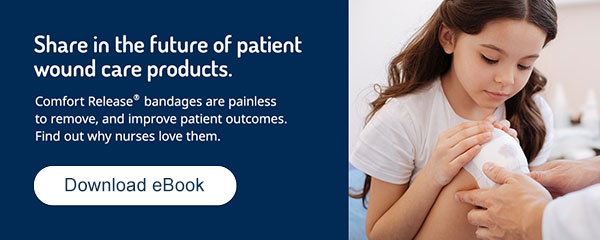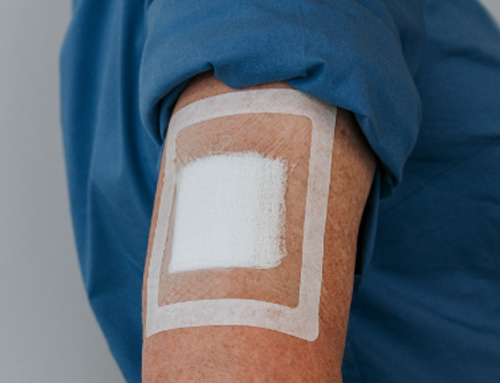A Medical Adhesive-Related Skin Injury (MARSI) is a skin condition caused by adhesive bandages during application or removal. The condition is especially problematic during the healing process as it can cause pain, damage, and infection, which increases recovery time. The incidence of MARSI varies quite dramatically, but appears to be closely related to a patient’s age and condition:
- Wounds International reported that 1.5 million skin tears occur each year in elderly patients in long-term senior care facilities in the US each year.
- In neonatal intensive care, the figure is slightly higher, at 17 percent.
- The lowest recorded figure was 5.8 percent for outpatients visiting an academic medical center.
Who is most at risk?
If anything, the statistics indicate that MARSI affects all age groups, particularly patients whose skin layers are thin. There are, however, certain factors that increase the risk:
- Dryness can cause fragile skin.
- Blood circulation problems, poor nutrition, and dehydration.
- Steroidal medication may result in skin-thinning.
- Skin allergies such as dermatitis and eczema.
- Radiation, chemotherapy, and age-related illnesses.
How to treat and prevent MARSI
MARSI can complicate an existing wound or treatment site, increasing the cost of healthcare and recovery time. This is especially problematic for infants and the elderly because healing takes longer and requires additional observation. Thankfully, there are a number of ways to treat and prevent MARSI effectively:
- For preparation, barrier wipes and sprays create a protective layer over the skin. These must be allowed to dry properly for safe removal.
- Dressings should be fully covered with tape and not just ‘picture framed’ around the edges.
- Only tape that is necessary for securing the dressing should be in contact with the skin.
- Avoid removing backing paper while the tape is being pulled, as this can stretch the skin.
- When you apply your tape, ensure that the adhesive is tension-free for easy removal.
- Warmth and pressure improve a dressing’s adhesion but rubbing that shreds the adhesive should be avoided as it can degrade its effectiveness.
- Peeling back or replacing the dressing is discouraged, as it promotes dislodgement and bacterial infection.
When combined with a bandage specifically designed for MARSI-prevention, these methods can prevent skin tears, blisters, and damage to healthy tissue that affect millions of US citizens every year.
Comfort Release — patented adhesive technology for pain-free removal
‘Sticks when you need it. Releases when you don’t.’
Comfort Release adhesive products are developed by doctors, recommended by clinicians and caregivers, and loved by patients. Created to halt MARSI in its tracks, our adhesive bandages, tapes, and dressings feature a unique polymer that facilitates secure adhesion to the skin. For removal, a simple swipe with rubbing alcohol triggers a pain-free release.
- Tiny perforations in the fabric and backing material make Comfort Release incredibly breathable.
- Each product is designed to withstand regular bathing and washing.
- They’re also long-lasting and suitable for sensitive skin, across all ages.
For the protection of fragile skin and the elimination of MARSI, check out our new products here or contact us here to request a sample and try for yourself!



